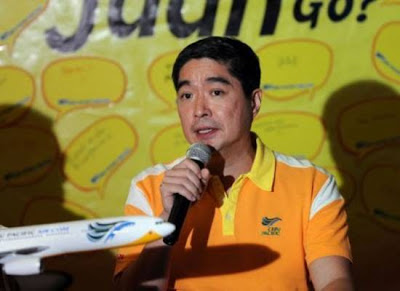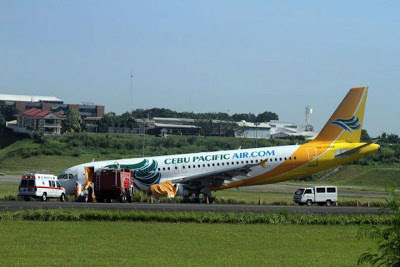Cebu Pacific Issues Apology, Passengers Unsatisfied
The President & CEO of Cebu Pacific issued a public apology on Monday following an incident involving one of the airline's Airbus A320-200 aircraft at Davao International Airport on Sunday evening.
The aircraft which was inbound from Manila overran the Davao runway under conditions of heavy rain with 165 passengers on board. While all 165 passengers made it off the aircraft safely, passengers are furious at the inadequate handling of the situation by the airline. But Cebu Pacific insists that standard protocol and procedures were followed.
"I would like to personally apologize to all affected," said Lance Gokongwei, President & CEO of Cebu Pacific. He said that the airline had brought in a "specialist team" to Davao to help recover the stranded aircraft which was obstructing the runway, resulting in the cancellation of dozens of flight on Sunday evening and all day on Monday.
Although the Civil Aviation Authority of the Philippines (CAAP) had intended to reopen Davao airport by 8:00pm on Monday night, weather related issued forced that goal to be pushed back to 7:00am on Tuesday morning. Gokongwei said that the airline's team along with the CAAP would continue to work throughout the night.
Cebu Pacific is insisting that the incident in Davao did not involve an "emergency" situation. "There was no emergency situation," said Gokongwei. "It was a precautionary disembarkation. The important thing is that all passengers disembarked safely." He was addressing the concerns of passengers as to why it took so long to evacuate the passengers off the aircraft.
Passengers have been venting their frustration about the poor handling of the incident by Cebu Pacific and the inadequate response by Davao emergency crews all over social media. But the airline insists that the pilots and cabin crew followed the industry's standard operating procedures. Gokongwei said that his crew onboard followed all of the necessary protocols and that he wanted to congratulate them. He added that if the protocol for emergency evacuation occurred, there may have been "further injury."
According to the airline, the pilot had been in communication with Davao airport tower just prior to commencing the aircraft's landing procedures. But upon touchdown, the aircraft skidded off the paved runway. Some eye witnesses suggest that the runway lights switched off as the aircraft touched down.
Gokongwei said that the pilots immediately shut down the engines of the aircraft while the crew waited for ground staff to retrieve passengers. Only upon the arrival of ground crews were the "forward emergency slides" deployed to enable passengers to disembark. Gokongwei insisted that the public must understand that the incident occurred during a heavy downpour.
But one passenger is clearly unsatisfied with the remarks of the airline's President. Jesuit priest and President of Ateneo de Davao University Joel Tabora said that he has ordered for the termination of the university's account with Cebu Pacific and that all university employees and students boycott the airline over the airline's neglect of passengers during the emergency. The university had been a long time patron of the airline for several years now. But Tabora said that the night of the incident, the airline proved that it wasn't worthy of such patronage.
He recalled the failure of Cebu Pacific's staff to provide assistance to distraught passengers following the abnormal landing when fire and smoke broke into the cabin from the engine before it came to a stop on the runway. Tabora said that no instructions were given or any words to attempt to calm passengers. In fact, it was a pilot of another airline that assumed responsibility of calming passengers down.
Tabora claimed that passengers were forced to remain in the smoke-filled cabin for 27 minutes before they were permitted to disembark via the forward emergency slide. "Twenty-seven minutes without appropriate communication is too long. What if the engine had exploded? What if someone choked due to the smoke? What if there was a medical situation aboard the aircraft?" said Tabora in a formal letter of complaint issued by the university to the airline.
Tabora continued that the boycott of the airline is a result of "manifest human failure" rather than mechanical failure. "Your personnel lack training for an emergency situation. They froze. They did not know what to do. They must be able to put the welfare of the passengers before their own and they must be trained to do so."
Tabora wants to make it clear that the outrage is driven by the crew's insensitivity toward passengers rather than any mechanical failure. While Gokongwei insists there was no emergency, Tabora says that the engine visibly caught fire before the plane came to a stop just off the runway.
In addition, Tabora reported that after passengers arrived in the terminal, they were not addressed by any employees of Cebu Pacific for at least an hour and a half. Tabora says that the university had students, faculty, and administrators aboard Flight 971 giving the university first hand information of what happened.
Meanwhile, Neri Colmenares, a Member of the Philippine House of Representatives and Human Rights Lawyer is calling for the airline to be investigated. He said that the incident "poses a serious threat to public safety" in that it was either caused by human error or mechanical failure. Colmenares also called upon the airline to cover all of the damages and expenses incurred by passengers including those of other airlines who were stranded as a result of the incident.
 |
| Copyright Photo: AFP |
"I would like to personally apologize to all affected," said Lance Gokongwei, President & CEO of Cebu Pacific. He said that the airline had brought in a "specialist team" to Davao to help recover the stranded aircraft which was obstructing the runway, resulting in the cancellation of dozens of flight on Sunday evening and all day on Monday.
Although the Civil Aviation Authority of the Philippines (CAAP) had intended to reopen Davao airport by 8:00pm on Monday night, weather related issued forced that goal to be pushed back to 7:00am on Tuesday morning. Gokongwei said that the airline's team along with the CAAP would continue to work throughout the night.
Cebu Pacific is insisting that the incident in Davao did not involve an "emergency" situation. "There was no emergency situation," said Gokongwei. "It was a precautionary disembarkation. The important thing is that all passengers disembarked safely." He was addressing the concerns of passengers as to why it took so long to evacuate the passengers off the aircraft.
 |
| Copyright Photo: AFP/KARLOS MANLUPIG |
According to the airline, the pilot had been in communication with Davao airport tower just prior to commencing the aircraft's landing procedures. But upon touchdown, the aircraft skidded off the paved runway. Some eye witnesses suggest that the runway lights switched off as the aircraft touched down.
Gokongwei said that the pilots immediately shut down the engines of the aircraft while the crew waited for ground staff to retrieve passengers. Only upon the arrival of ground crews were the "forward emergency slides" deployed to enable passengers to disembark. Gokongwei insisted that the public must understand that the incident occurred during a heavy downpour.
But one passenger is clearly unsatisfied with the remarks of the airline's President. Jesuit priest and President of Ateneo de Davao University Joel Tabora said that he has ordered for the termination of the university's account with Cebu Pacific and that all university employees and students boycott the airline over the airline's neglect of passengers during the emergency. The university had been a long time patron of the airline for several years now. But Tabora said that the night of the incident, the airline proved that it wasn't worthy of such patronage.
He recalled the failure of Cebu Pacific's staff to provide assistance to distraught passengers following the abnormal landing when fire and smoke broke into the cabin from the engine before it came to a stop on the runway. Tabora said that no instructions were given or any words to attempt to calm passengers. In fact, it was a pilot of another airline that assumed responsibility of calming passengers down.
Tabora claimed that passengers were forced to remain in the smoke-filled cabin for 27 minutes before they were permitted to disembark via the forward emergency slide. "Twenty-seven minutes without appropriate communication is too long. What if the engine had exploded? What if someone choked due to the smoke? What if there was a medical situation aboard the aircraft?" said Tabora in a formal letter of complaint issued by the university to the airline.
 |
| Copyright Photo: PhilStar.com |
Tabora wants to make it clear that the outrage is driven by the crew's insensitivity toward passengers rather than any mechanical failure. While Gokongwei insists there was no emergency, Tabora says that the engine visibly caught fire before the plane came to a stop just off the runway.
In addition, Tabora reported that after passengers arrived in the terminal, they were not addressed by any employees of Cebu Pacific for at least an hour and a half. Tabora says that the university had students, faculty, and administrators aboard Flight 971 giving the university first hand information of what happened.
Meanwhile, Neri Colmenares, a Member of the Philippine House of Representatives and Human Rights Lawyer is calling for the airline to be investigated. He said that the incident "poses a serious threat to public safety" in that it was either caused by human error or mechanical failure. Colmenares also called upon the airline to cover all of the damages and expenses incurred by passengers including those of other airlines who were stranded as a result of the incident.







No comments